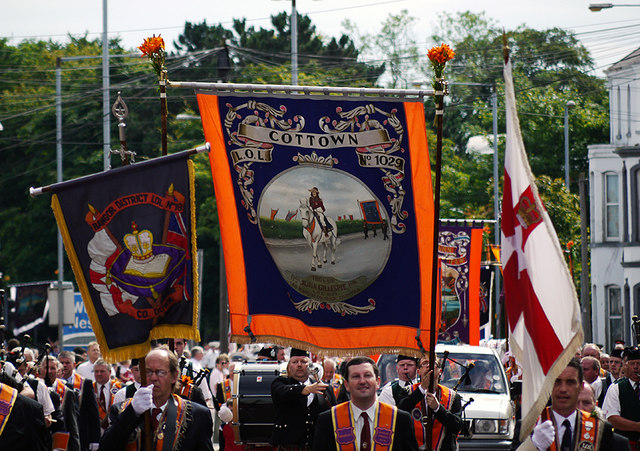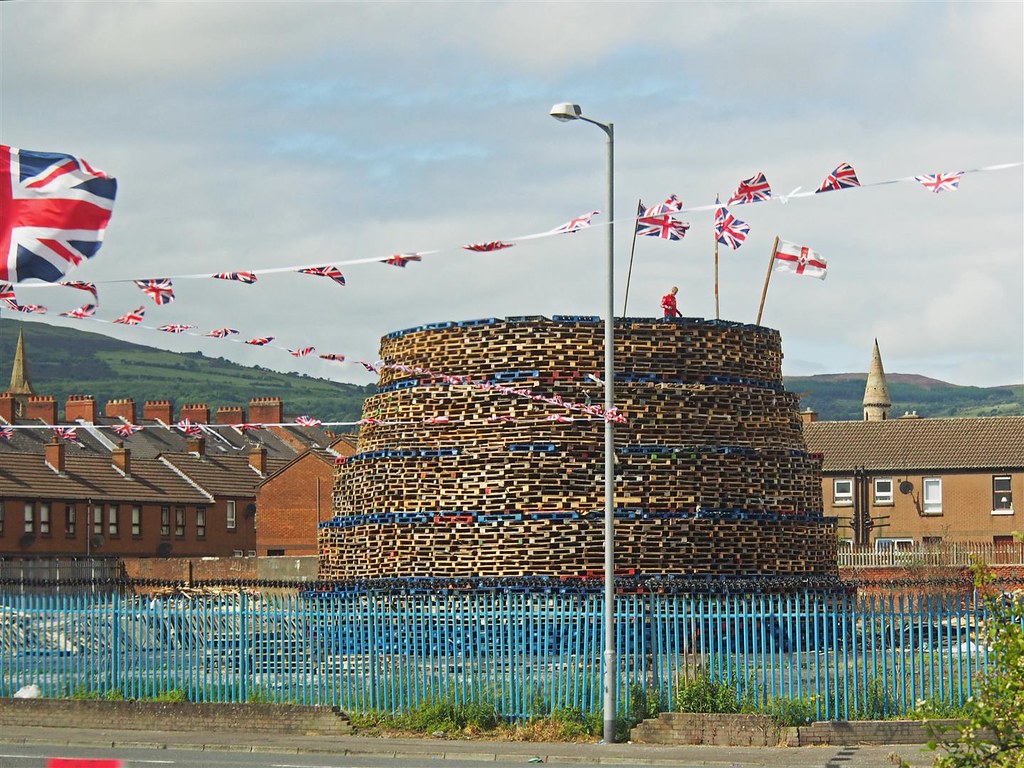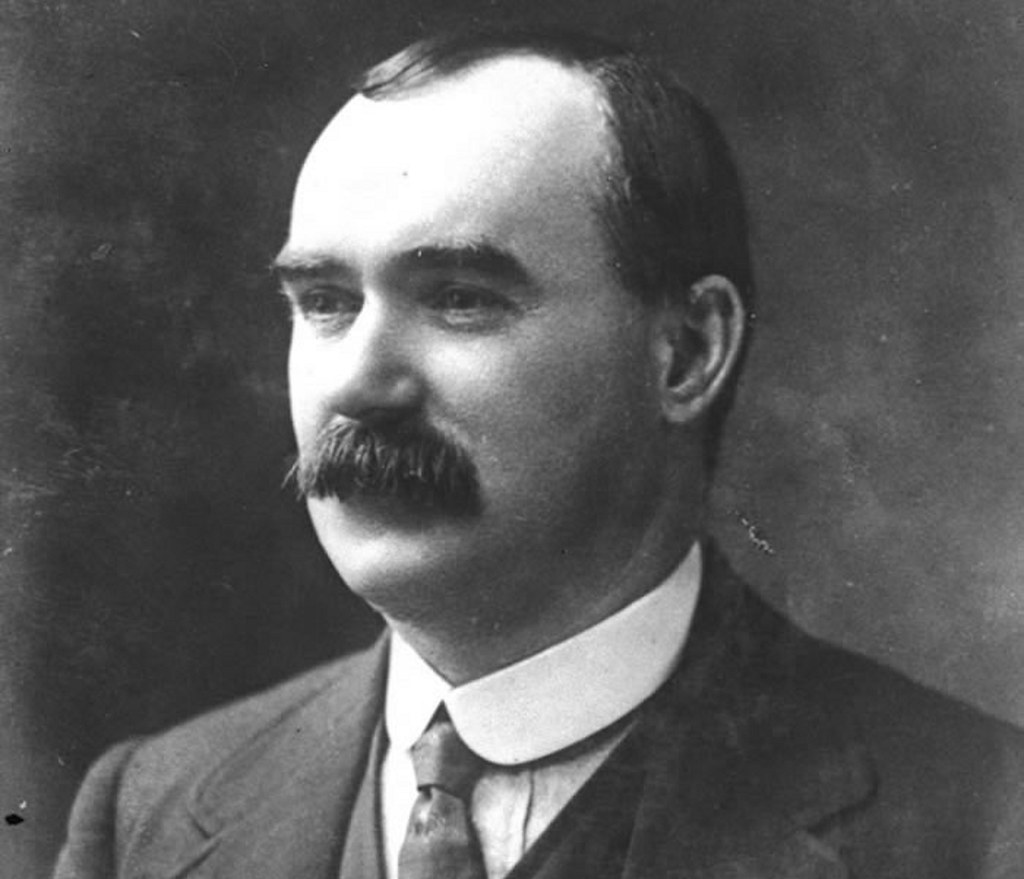The 12 July celebrations, 'The Twelfth', are the height of the marching season in Ireland. It's a day for Protestants and Unionists in Ireland to celebrate the defeat of the Jacobite forces by the Williamites in 1690. The parade was used politically by the Orange Order and reactionary loyalist forces to show their dominance in the North, especially in Belfast, often invoking sectarian riots and violence, which plague the Twelfth. In 1913, James Connolly, Irish revolutionary, explained his thoughts on this day, its real historical basis, and what it means to the people of Ireland.
As this Saturday is the 12th of July, and as I am supposed to be writing about the North of Ireland in particular, it becomes imperative that I say something about this great and glorious festival.
The Anniversary of the Battle of the Boyne is celebrated in Belfast by what is locally known as an Orange Walk. The brethren turn out and take possession of the principal streets of the city, and for the space of some hours they pass in processional order before the eyes of the citizens, bearing their banners, wearing their regalia, carrying symbols emblematic of the gates of Derry, and to the accompaniment of a great many bands.
Viewing the procession as a mere ‘Teague’ (to use the name the brethren bestow on all of Catholic origin), I must confess that some parts of it are beautiful, some of it ludicrous, and some of it exceedingly disheartening.
The regalia is often beautiful; I have seen representations of the Gates of Derry that were really a pleasure to view as pieces of workmanship; and similar representations erected as Orange arches across dingy side streets that, if we could forget their symbolism, we would admire as real works of art.
The music (?) is a fearful and wonderful production, seemingly being based upon a desire to produce the maximum of sound in the minimum of space. Every Orange Lodge in the North of Ireland, and many from the South make it a point to walk, and as each Lodge desires to have a band without any regard to its numbers, the bands are often so near that even the most skilful manipulator cannot prevent a blending of sounds that can scarcely be called harmonious.
I have stood on the sidewalk listening to a band, whose instruments were rendering:
Jesus, lover of my soul,
Let me to thy bosom fly.
Whilst another one about twenty yards off was splitting the air with:
Dolly’s Brae, O Dolly’s Brae,
O, Dolly’s Brae no more;
The song we sang was kick the Pope
Right over Dolly’s Brae.
But the discord of sound allied to the discord of sentiment implied in a longing to fly to the bosom of Jesus, and at the same time to kick the Pope, did not appear to strike anyone but myself.
For that matter a sense of humour is not one of the strong points in an Orangeman’s nature. The dead walls of Belfast are decorated with a mixture of imprecations upon Fenians, and, the Pope, and invocations of the power and goodness of the Most High, interlarded with quotations from the New Testament. This produces some of the most incongruous results. What would the readers of Forward say to seeing written up on the side of a wall off one of the main streets, the attractive legend:
God is Love,
Hell Roast the Pope.
Of course, the juxtaposition of such inscriptions on the walls appears absurd, and yet, the juxtaposition of sentiments as dissimilar is common enough in the minds of all of us, I suppose.
 "The Anniversary of the Battle of the Boyne is celebrated in Belfast by what is locally known as an Orange Walk...The dead walls of Belfast are decorated with a mixture of imprecations upon Fenians, and, the Pope, and invocations of the power and goodness of the Most High" / Image: Ross
"The Anniversary of the Battle of the Boyne is celebrated in Belfast by what is locally known as an Orange Walk...The dead walls of Belfast are decorated with a mixture of imprecations upon Fenians, and, the Pope, and invocations of the power and goodness of the Most High" / Image: Ross
To anyone really conversant with the facts bearing upon the relations of the religious in Ireland, and the part played by them in advancing or retarding the principles of civil and religious liberty, the whole celebration appears to be foolish enough.
The belief sedulously cultivated by all the orators, lay and clerical, as well as by all the newspapers is, that the Defence of Derry and the Battle of the Boyne were great vindications of the principles of civil and religious liberty, which were menaced by the Catholics, and defended by the Protestants of all sects.
The belief we acquire from a more clear study of history in Ireland is somewhat different. Let me tell it briefly. In the reign of James I, the English Government essayed to solve the Irish problem, which then, as now, was their chief trouble, by settling Ireland with planters from Scotland and England. To do this, two million acres were confiscated, i.e., stolen from the Irish owners. Froude, the historian, says:
“Of these, a million and a half, bog-forest and mountain were restored to the Irish. The half a million of fertile acres were settled with families of Scottish and English Protestants.”
A friendly speaker, recently describing these planters before a meeting of the Belfast Liberal Association, spoke of them as:
“Hardy pioneers, born of a sturdy race, trained to adversity, when brought face to face with dangers of a new life in a hostile country, soon developed that steady, energetic, and powerful character which has made the name of Ulster respected all over the world.”
And a writer in the seventeenth century, the son of one of the ministers who came over with the first plantation, Mr. Stewart, is quoted by Lecky in his History of England in the Eighteenth Century, as saying:
“From Scotland came many, and from England not a few, yet all of them generally the scum of both nations, who from debt, or breaking the law or fleeing from justice, or seeking shelter, come hither, hoping to be without fear of man’s justice in a land where there was nothing, or but little as yet, of the fear of God ... On all hands Atheism increased, and disregard of God, iniquity abounded, with contentious fighting, murder, adultery.”
The reader can take his choice of these descriptions. Probably the truth is that each is a fairly accurate description of a section of the planters, and that neither is accurate as a picture of the whole.
But while the Plantation succeeded from the point of view of the Government in placing in the heart of Ulster a body of people who, whatever their disaffection to that Government, were still bound by fears of their own safety to defend it against the natives, it did not bring either civil or religious liberty to the Presbyterian planters.
The Episcopalians were in power, and all the forces of government were used by them against their fellow-Protestants. The planters were continually harassed to make them adjure their religion, fines were multiplied upon fines, and imprisonment upon imprisonment. In 1640, the Presbyterians of Antrim, Down, and Tyrone, in a petition to the English House of Commons, declared that:
“Principally through the sway of the prelacy with their factions our souls are starved, our estates are undone, our families impoverished, and many lives among us cut off and destroyed ... Our cruel taskmasters have made us who were once a people to become as it were no people, an astonishment to ourselves, the object of pittie and amazement to others.”
What might have been the result of this cruel, systematic persecution of Protestants by Protestants we can only conjecture, since, in the following year, 1641, the great Irish rebellion compelled the persecuting and persecuted Protestants to join hands in defence of their common plunder against the common enemy – the original Irish owners.
In all the demonstrations and meetings which take place in Ulster under Unionist Party auspices, all these persecutions are alluded to as if they had been the work of “Papists,” and even in the Presbyterian churches and conventions, the same distortion of the truth is continually practised.
But they are told:
“all this persecution was ended when William of Orange, and our immortal forefathers overthrew the Pope and Popery at the Boyne. Then began the era of civil and religious liberty.”
So runs the legend implicitly believed in in Ulster. Yet it is far, very far, from the truth. In 1686 certain continental powers joined together in a league, known in history as the league of Augsburg, for the purpose of curbing the arrogant power of France. These powers were impartially Protestant and Catholic, including the Emperor of Germany, the King of Spain, William, Prince of Orange, and the Pope. The latter had but a small army, but possessed a good treasury and great influence. A few years before a French army had marched upon Rome to avenge a slight insult offered to France, and His Holiness was more than anxious to curb the Catholic power that had dared to violate the centre of Catholicity. Hence his alliance with William, Prince of Orange.
King James II, of England, being insecure upon his throne, sought alliance with the French monarch.
When, therefore, the war took place in Ireland, King William fought, aided by the arms, men, and treasures of his allies in the League of Augsburg, and part of his expenses at the Battle of the Boyne was paid for by His Holiness, the Pope. Moreover, when news of King William’s victory reached Rome, a Te Deum was sung in celebration of his victory over the Irish adherents of King James and King Louis.
Therefore, on Saturday the Orangemen of Ulster, led by King Carson, will be celebrating the same victory as the Pope celebrated 223 years ago.
Nor did the victory at the Boyne mean Civil and Religious Liberty. The Catholic Parliament of King James, meeting in Dublin in 1689, had passed a law that all religions were equal, and that each clergyman should be supported by his own congregation only, and that no tithes should be levied upon any man for the support of a church to which he did not belong. But this sublime conception was far from being entertained by the Williamites who overthrew King James and superseded his Parliament. The Episcopalian Church was immediately re-established, and all other religions put under the ban of the law. I need not refer to the Penal Laws against Catholics, they are well enough known. But sufficient to point out that England and Wales have not yet attained to that degree of religious equality established by Acts XIII and XV of the Catholic Parliament of 1689, and that that date was the last in which Catholics and Protestants sat together in Parliament until the former compelled an Emancipation Act in 1829.
 "[T]he desire of the Irish people to control their own destinies is a part of the desire of the workers to forge political weapons for their own enfranchisement as a class. The Orange fanatic and the Capitalist-minded Home Ruler are alike in denying this truth; ere long, both of them will be but memories, while the army of those who believe in that truth will be marching and battling on its conquering way" / Image: Flickr, Bob White
"[T]he desire of the Irish people to control their own destinies is a part of the desire of the workers to forge political weapons for their own enfranchisement as a class. The Orange fanatic and the Capitalist-minded Home Ruler are alike in denying this truth; ere long, both of them will be but memories, while the army of those who believe in that truth will be marching and battling on its conquering way" / Image: Flickr, Bob White
For the Presbyterians the victory at the Boyne simply gave a freer hand to their Episcopalian persecutors. In 1704 Derry was rewarded for its heroic defence by being compelled to submit to a Test Act, which shut out of all offices in the Law, the Army, the Navy, the Customs and Excise, and Municipal employment, all who would not conform to the Episcopalian Church. The alderman and fourteen burgesses are said to have been disfranchised in the Maiden City by this iniquitous Act, which was also enforced all over Ireland. Thus, at one stroke, Presbyterians, Quakers, and all other dissenters were deprived of that which they had imagined they were fighting for at “Derry, Aughrim, and the Boyne.” Presbyterians were forbidden to be married by their own clergymen, the Ecclesiastical Courts had power to fine and imprison offenders, and to compel them to appear in the Parish Church, and make public confession of fornication, if so married. At Lisburn and Tullylish, Presbyterians were actually punished for being married by their own ministers. Some years later, in 1712, a number of Presbyterians were arrestcd for attempting to establish a Presbyterian meeting house in Belturbet.
The marriage of a Presbyterian and an Episcopalian was declared illegal, and in fact, the ministers and congregations of the former church were treated as outlaws and rebels, to be fined, imprisoned, and harassed in every possible way. They had to pay tithes for the upkeep of the Episcopalian ministers, were fined for not going to the Episcopalian Church, and had to pay Church cess for buying sacramental bread, ringing the bell, and washing the surplices of the Episcopalian clergymen. All this, remember, in the generation immediately following the Battle of the Boyne.
The reader should remember what is generally slurred over in narrating this part of Irish history, that when we are told that Ulster was planted by Scottish Presbyterians, it does not mean that the land was given to them. On the contrary, the vital fact was, and is, that the land was given to the English noblemen and to certain London companies of merchants who had lent money to the Crown, and that the Scottish planters were only introduced as tenants of these landlords. The condition of their tenancy virtually was that they should keep Ireland for the English Crown, and till the land of Ireland for the benefit of the English landlord.
That is in essence the demand of the Unionist Party leaders upon their followers today. In the past, as the landlords were generally English and Episcopalian, they all, during the eighteenth century, continually inserted clauses in all their leases, forbidding the erection of Presbyterian meeting houses. As the uprise of democracy has contributed to make this impossible today in Ireland, the landlord and capitalist class now seek an alliance with these Protestants they persecuted for so long in order to prevent a union of the democracy of all religious faiths against their lords and masters.
To accomplish this they seek insidiously to pervert history, and to inflame the spirit of religious fanaticism. The best cure I know of for that evil is a correct understanding of the events they so distort in their speeches and sermons. To this end I have ever striven to contribute my mite, and while I know that the sight of the thousands who, on July 12, will march to proclaim their allegiance to principles of which their order is a negation, will be somewhat disheartening. I also know that even amongst the Orange hosts, the light of truth is penetrating.
In conclusion, the fundamental, historical facts to remember are that:
- The Irish Catholic was despoiled by force,
- The Irish Protestant toiler was despoiled by fraud,
- The spoliation of both continues today under more insidious but more effective forms,
and the only hope lies in the latter combining with the former in overthrowing their common spoilers, and consenting to live in amity together in the common ownership of their common country – the country which the spirit of their ancestors or the devices of their rulers have made – the place of their origin, or the scene of their travail.
I have always held, despite the fanatics on both sides, that the movements of Ireland for freedom could not and cannot be divorced from the world-wide upward movements of the world’s democracy. The Irish question is a part of the social question, the desire of the Irish people to control their own destinies is a part of the desire of the workers to forge political weapons for their own enfranchisement as a class.
The Orange fanatic and the Capitalist-minded Home Ruler are alike in denying this truth; ere long, both of them will be but memories, while the army of those who believe in that truth will be marching and battling on its conquering way.

